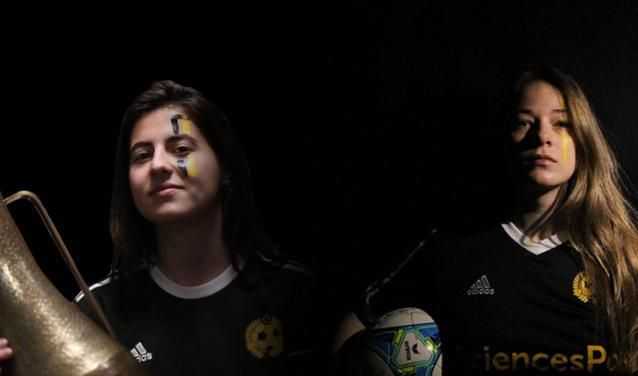Home>“Female Footballers Are Finally Being Taken Seriously”

20.01.2020
“Female Footballers Are Finally Being Taken Seriously”
Fall 2019 - At the start of the football season, we interviewed Juliette Hurier and Matilde Alvarez Morera, the captains of ‘Les Biches’, the women’s football team of Sciences Po.
How long have you been playing football at Sciences Po?
Juliette: As soon as I arrived at Sciences Po in the first year of the undergraduate college, I wanted to take up this sport again, which I had put aside for too long. Football has always been a part of my life, but the preconceptions/prejudices attached to women’s football discouraged me from playing the sport. It was thus very important for me to emancipate myself from these pressures by joining this well-respected and admired women’s sports team at Sciences Po.
Last year, the (women’s football) team set the bar really high with their performance. Do you feel under pressure to deliver the same level of performance this year, or to do even better?
Matilde: We want to do better this year and hopefully make it to the final rounds of the French national championships. Last year’s team was a great one, with a lot of talented individual players. But this year is a whole other deal. We haven’t started the season yet and you can already see a fantastic team coming together with a really strong level… but I don’t want to jinx it! Recruitment was successful and we have a very international team, so it’s very exciting.
Who were your sporting role models growing up, and who are they now?
Matilde: My family is from Argentina and football is obviously quite at the core of most of our discussions. Messi was mentioned over and over again, and is the player I would continue to support for sure. But sports idol? I would without hesitation say Serena Williams. She is strong, she is powerful, she is an incredible tennis player, she is fantastic at interviews, and she had a kid at the same time! It is worth mentioning Macarena Sanchez as well, who negotiated the first professional soccer contract for a woman in Argentina this year. But watching the Women’s World Cup and hearing about women from different countries with their own national struggles was heartwarming and distressing at the same time.
What is it like to go from being ‘one of the players’ to team captains? What are your leadership styles?
Juliette: Becoming captain is a heavy responsibility and no longer only assumes having to give one’s maximum on the field during matches. Captains must assure the cohesion of the team, motivate all the players, and above all make them feel like they are accepted and at home, no matter their individual performance. I would say that Matilde and I have two leadership styles that are distinct yet complementary. Matilde embodies the dynamism of the team - she’s always cheerful and always behind her players… I’d say that I am more discreet when it comes to game-building and the individual accompaniment of the players. A good duo that functions perfectly, both on and off the pitch!
Were you able to watch the games of or attend the Women’s World Cup in France during the summer of 2019?
Juliette: Of course! I watched all the matches of the French team with my friends, with the same kind of ambiance and level of enthusiasm as I did for the men’s team the previous year.
Matilde: Yes, absolutely! I watched it with my little brother and his friends, sometimes in bars in Paris. The screenings were often hosted by an organisation founded by Sciences Po alumni from our team! Many players on our team were also volunteers at the World Cup.
What did it mean to you to have so much attention being paid to women’s football this year?
Juliette: The FIFA Women’s World Cup began in France around the time that I returned from my third year abroad in the United States. In the US, women’s football is given full consideration and is highly promoted. I thus was very hopeful that I’d see the same kind of enthusiasm in France.
I think that women’s football in France certainly benefited from the hype attached to the victory of the French team in the 2018 men’s world cup, but it has also undergone a major transition linked to fundamental work that was carried out over many years.
Female footballers are finally being taken seriously, in the same vein as male athletes, and with the same performance. Little girls no longer have to be afraid to tell their parents they want to play football. This is all also linked to publicity, because being able to see women proudly wearing the French jersey on a daily basis, in the windows of stores, on buses, on TV, makes it a visible and attractive reality!
How do you see your team’s future in the years to come?
Matilde: The idea of playing 8v8 was to encourage women soccer teams to evolve towards 11v11. The league didn’t quite work nationally, but I do hope it will develop soon. Otherwise, Juliette and I, like other captains before, are focused on ensuring that the spirit of the Biches team continues to thrive in the following years. Our team is well set in national rankings - hopefully we will maintain that reputation!
Related links
- Sciences Po girls conquer rugby
- "Fencing is a spectacular sport"
- Dancing to the beat of Sciences Po
- See all #StudentLife articles
More information